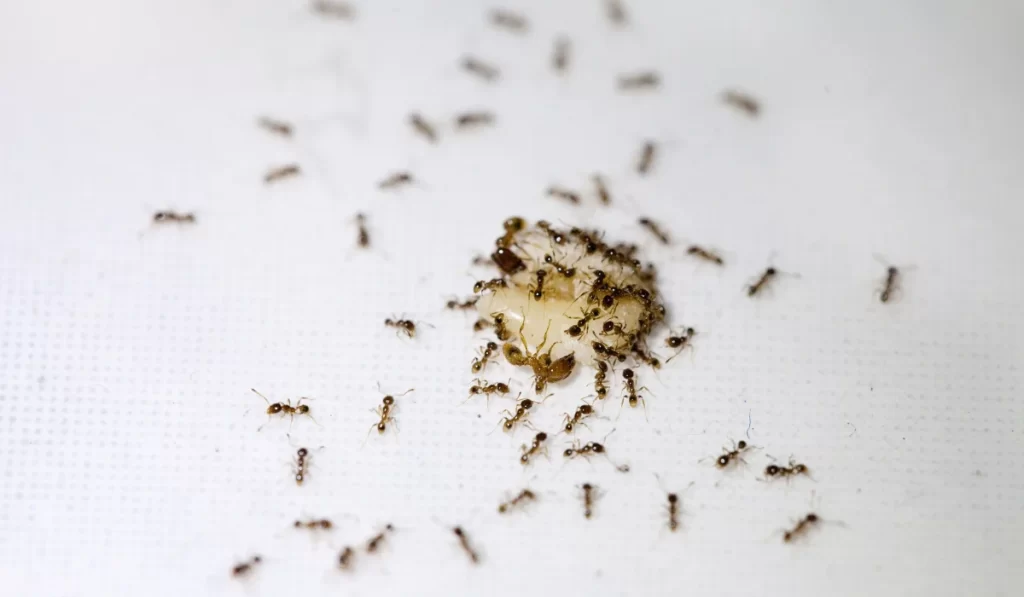Tiny ants might be small in size, but they can cause big headaches for homeowners in Florida, especially in humid places like Orlando. According to the University of Florida IFAS, ants are the most common pest reported in Florida homes.
These pests are notorious for invading kitchens, bathrooms, and anywhere they can find food and water. And if you’re seeing just a few now, you might be looking at the early signs of a full-blown ant infestation.
Here’s the thing: the best way to tackle an ant problem is by understanding how they operate and using the right strategies to keep them out for good.
Let’s get into some of the most effective tips for getting rid of tiny ants in Central Florida.
Key Takeaways
- Different types of tiny ants in Florida need different treatments to stop the infestation from spreading.
- Ants leave behind scent trails, so wiping surfaces and sealing cracks can help stop new ants from coming.
- Bait stations work best because ants bring poison back to the nest and wipe out the whole colony.
- Cleaning up food and water sources helps, but sometimes only a pest control company can get rid of them.
Identify the Type of Ant Invading Your Home
Knowing the species of ants that have moved in can make a huge difference in how you get rid of them.
Ghost ants, also known as sugar ants, are common in Orlando and are usually found near water sources like sinks and bathrooms. On the other hand, pharaoh ants tend to nest in wall voids and are tough to control without professional help.
Each type of small ant builds its nest in different places, follows different scent trails, and feeds on different materials, including protein, sugar, and even honeydew from aphids.
Disrupt Their Ant Trails
Tiny ants rely on pheromone trails to guide other worker ants to food.
If you spot a trail on your baseboards, near the sink, or across the floor, you’re seeing their scent trails in action. Wipe down these ant trails with vinegar and water or a repellent made in a spray bottle to throw them off course.
If you skip this step, even your best pest control efforts may not stick.
Set Bait Stations to Target the Colony
When it comes to DIY pest control, ant baits and bait stations are your best friends. While it’s tempting to reach for ant sprays, those only kill the ants you can see.
Ant baits work by attracting worker ants, who then carry the bait back to the ant colony. It’s a slow process, but it’s the only way to take out the queen and destroy the ant nest at its source.
Place ant traps near entry points like crevices, cracks in caulk, or behind appliances. The key is to be patient and let the bait do the work.
Seal Up All Entry Points
You’d be amazed at how small the entry points can be for ants to squeeze through. Their small size allows them to crawl in through gaps in caulk, under doors, or along windowsills. Sealing crevices with high-quality caulk and installing door sweeps can help prevent future infestations.
In addition to pest-proofing your doors and windows, don’t forget about less obvious access points like plumbing penetrations and gaps in your exterior walls.
Remove Their Food Sources
Ants are constantly on the lookout for easy meals. That means every crumb on the floor, every drop of juice on your countertops, and every uncovered dish left overnight is a welcome mat for house ants. Store snacks in airtight containers and clean spills immediately.
Don’t forget about pet food. Leaving kibble out all day can attract not only them, but also other pests like roaches, wasps, and even termites.
Keeping your space clean is one of the simplest forms of ant control.
Watch for Moisture Issues
Most homeowners focus only on food, but water sources are just as attractive to ants. Leaky pipes, standing water under the sink, and moist wood from past termite damage can all bring ants into your home.
If you live in South Florida or anywhere else prone to high humidity, make sure your home stays dry and well-ventilated. Fix any leaks and use a dehumidifier in damp areas like basements and bathrooms.
Try Natural and DIY Solutions
For folks looking for eco-friendlier options, diatomaceous earth and borax are solid additions to your DIY toolkit.
Diatomaceous earth kills ants by damaging their exoskeleton, while borax can be mixed with sugar or peanut butter to form a deadly bait that ants carry back to the colony.
These methods are especially helpful if you want to avoid heavy use of ant sprays around kids and pets.
Know When to Call a Professional Pest Control Company
If you’ve tried all the above and are still seeing trails of tiny ants, or worse, black ants, fire ants, or carpenter ants, inside your home, it might be time to bring in the pros.
Persistent infestations often mean you’ve missed the ant colony’s main nest or failed to eliminate new colonies forming nearby.
At Rowland Pest Management, we offer pest control services across Orlando and Central Florida. As a licensed professional pest control company, we go beyond surface treatments.
Our team identifies the specific kind of ant causing your problem, uses the right bait strategy, and ensures your home stays ant-free with follow-up services and preventive advice.
Think you’ve tried everything? Call us today and let our Orlando-based experts inspect your home and solve the problem for good.
Frequently Asked Questions
Still have questions about dealing with tiny ants in your home? Here are a few more things homeowners often want to know:
Can ants nest inside walls or appliances?
Yes, some ants build nests inside wall voids, electrical outlets, or appliances where it’s warm and hidden. These nests are hard to find and often require professional pest control to fully eliminate.
Are certain times of year worse for ant infestations in Florida?
Yes, spring and summer are peak ant seasons in Florida due to warm weather and increased rain. Ants are more active then, scouting for food and new places to build colonies indoors.
Will using multiple ant control products at once work better?
Using too many products can backfire. Some sprays can repel ants from bait stations, making treatments less effective. It’s best to use a targeted strategy based on the type of ant.


